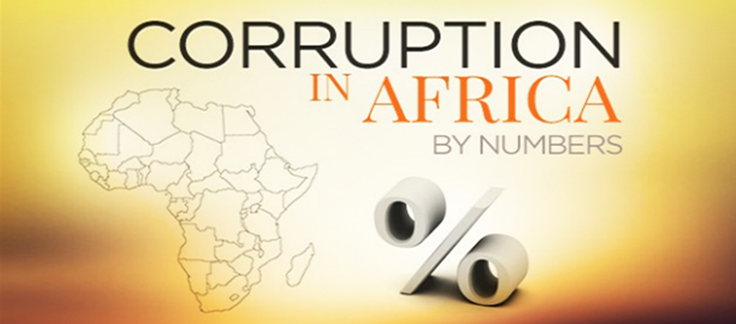Africa is blessed with natural resources like gold, oil, diamonds, cobalt, iron, copper, uranium, silver, bauxite, cocoa beans and petroleum. Unfortunately the standard of living of many people in the continent is deplorable. This is largely due to corrupt governments ruling many countries in the African continent.
Transparency International has been publishing the corruption perceptions index (CPI) since the turn of the new millennium. If a country has a CPI of 100 it is very clean. If the score is 0, then the country is highly corrupt.
Here is a brief overview of the top 20 most corrupt nations in Africa as of 2014, according to Transparency International.
=24. Mozambique (CPI score: 31)
Although the government of Mozambique has taken steps to fight corruption, its still a big problem. Corruption remains in both the public and donors, who support almost half of the nation’s budget.
=24. Sierra Leone (CPI score: 31)
Systematic corruption has caused weak governance and widespread poverty in Sierra Leone. The anti-corruption institutions still lack resources, staff and expertise.
=24. Tanzania (CPI score: 31)
Although there are comprehensive laws to fight corruption, its still a serious problems in Tanzania with bribery is often demanded in the business sector.
23. Mauritania (CPI score: 30)
Corruption has become deeply entrenched in Mauritania. Part of what fuels corruption in this nation is the insufficient information or absence of transparency about local companies, the identities of their owners, and financial report.
=21. Gambia (CPI score: 29)
Gambia’s judiciary is subject to pervasive political interference, and there is corruption in many parts of the government.
=21. Togo (CPI score: 29)
Corruption in Togo is common and those involved rarely punish. Corruption more among prison and police officers, and members of the judiciary.
=20. Madagascar (CPI score: 28)
Madagascar is one of the world’s poorest countries and has had a negative growth due to corruption.
=18. Cameroon (CPI score: 27)
In Cameroon, many corrupt civil servants drive around in their expensive luxury cars. People who try to bring these corrupt officers to justice pay a high price.
=18. Nigeria (CPI score: 27)
Political corruption pervades Nigeria. The rise of public administration and discovery of petroleum and natural gas have led to corrupt practices.
=16. Comoros (CPI score: 26)
Corruption remained a serious problem in Comoros, it lacks rule of law. The nation gained independence from France in 1975. Since then it has witnessed around 20 coups or coup attempts.
=16. Uganda (CPI score: 26)
Even though the country has experienced high growth rates in recent years, corruption remains widespread at all levels.
=14. Guinea (CPI score: 25)
Rampant corruption in Guinea is hindering economic growth and increasing drug trafficking.
=14. Kenya (CPI score: 25)
Political corruption in the post-colonial government of Kenya has had a history which spans the era of the Jomo Kenyatta and Daniel arap Moi’s KANU governments to Mwai Kibaki’s PNU government. Experts estimate that an average urban Kenyan pays 16 bribes in a month.
=13. Central African Republic (CPI score: 24)
Growth of Central African Republic is significantly hindered by wide spread corruption. Corruption is rife and undermines timber and diamond industries.
=12. Republic of Congo (CPI score: 23)
In spite of its oil wealth, Republic of Congo is one of the most indebted nations in the world. This is largely due to rampant corruption.
=10. Chad (CPI score: 22)
Feud and corruption are blocking Chad’s economic growth. Revenue from oil is not spent responsibly. Corruption rules this nation.
=10. Democratic Republic of Congo (CPI score: 22)
As the nation emerges from a long period of violence and instability, it struggles with a legacy of entrenched corruption at all levels.
=9. Zimbabwe (CPI score: 21)
Corruption in Zimbabwe has become endemic within its political, private and civil sectors. In 2011, finance minister Tendai Biti claimed that at least $1 billion in diamond related revenue owed to the national treasury remains unaccounted for.
=8. Burundi (CPI score: 20)
Despite the establishment of anti-corruption agencies, Burundi is remains a corrupt country in sub-Saharan Africa.
=6. Angola (CPI score: 19)
Corruption is a pervasive phenomenon in Angola. The current government is working on containing corruption by enacting laws and enforcing integrity systems.
=6. Guinea Bissau (CPI score: 19)
Guinea Bissau was once hailed as a potential model for African development. Today it is one of the poorest nations in the world. This is largely due to corruption among high-ranking officials.
=4. Eritrea (CPI score: 18)
People in Eritrea are living in a fear-ridden environment. Corruption and greed are rampant among the members of the ruling party.
=4. Libya (CPI score: 18)
Before the downfall of the Qadhafi regime in 2011, weak rule of law and systematic corruption had largely marginalized private sector activity in the nation. Corruption is the biggest problem facing Libya today.
=3. South Sudan (CPI score: 15)
Since independence, South Sudan has taken steps to promote transparency and accountability in an endeavor to eliminate corruption. Unfortunately political will is lacking in effective implementation of anti-corruption policies.
=2. Sudan (CPI score: 11)
Top ranking government officials are frequently involved in corrupt practices in Sudan. This has impacted the economic growth negatively. It is a huge challenge to do business in Sudan. Sectors like construction and transportation are prone to corruption.
=1. Somalia (CPI score: 8)
The Federal Republic of Somalia is located in the horn of Africa. Around 10 million people live in this country. It is the most corrupt nation in the world. There is lack of accountability in receipt and expenditure of public funds. Currently a parliamentary finance committee has been established to oversee all withdrawal transactions from the Central Bank, which is Somalia’s official monetary authority.
If the above-mentioned nations tackle corruption effectively, they will be able to enhance the standard of living of their people significantly.
To see the full list, visit Transparency International


 Post a comment
Post a comment 








